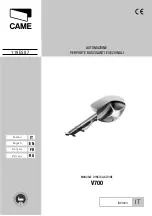
5
Fire hazard. Plasma cutting on closed containers, such as tanks,drums, or pipes, can cause them to
explode. Flying sparks from the welding arc, hot work piece, and hot equipment can cause fires and burns.
Accidental contact of electrode to metal objects can cause sparks, explosion, overheating, or fire. Check
and be sure the area is safe before doing any cutting.
• The cutting sparks may cause fire, therefore remove any flammable materials well away from the working
area. Cover flammable materials and containers with
approved covers if unable to be moved from the welding area.
•Do not Plasma Cut closed containers such as tanks, drums, or pipes, unless they are
properly prepared according to the required Safety Standards to insure that flammable
or toxic vapors and substances are totally removed, these can cause an explosion even
though the vessel has been “cleaned”. Vent hollow castings or containers before heating,
cutting or welding. They may explode.
• Do not cut where the atmosphere may contain flammable dust, gas, or liquid vapours (such as petrol)
• Have a fire extinguisher nearby and know how to use it. Be alert that cutting sparks and hot materials
from cutting can easily go through small cracks and openings to adjacent areas. Be aware that cutting
on a ceiling, floor, bulkhead, or partition can cause fire on the hidden side.
Gas Cylinders. Do not cut in the vicinity of pressurised gas cylinders or in the presence of
explosive dust, gases or fumes. Gas cylinders contain gas under high pressure. If damaged,
a cylinder can explode. Because gas cylinders are normally part of the welding process, be
sure to treat them carefully. CYLINDERS can explode if damaged.
• Protect gas cylinders from excessive heat, mechanical shocks, physical damage, slag, open flames,
sparks, and arcs.
• Insure cylinders are held secure and upright to prevent tipping or falling over.
• Never allow the plasma nozzle or earth clamp to touch the gas cylinder, do not drape welding cables
over the cylinder.
• Never plasma cut on a pressurised gas cylinder, it will explode and kill you.
• Open the cylinder valve slowly and turn your face away from the cylinder outlet valve and gas regulator.
Electronic magnetic fields. The magnetic fields created by the high currents generated by
plasma cutting may affect the operation of pacemakers and other vital electronic medical
equipment.
• Wearers of Pacemakers and other Implanted Medical Devices should keep away.
• Implanted Medical Device wearers should consult their doctor and the device manufacturer before going
near any electric welding, cutting or heating operation.
Noise can damage hearing. Noise from some processes or equipment can damage hearing.
This machine does not directly produce noise exceeding 80dB. The plasma cutting/welding
procedure may produce noise levels beyond said limit; users must therefore implement all
precautions required by law. Wear approved ear protection if noise level is high.
Hot parts. Items being plasma cut generate and hold high heat and can cause severe burns.
Do not touch hot parts with bare hands. Allow a cooling period before working on the plasma
torch. Use insulated welding gloves and clothing to handle hot parts and prevent burns.
Arc rays: harmful to people’s eyes and skin. Arc rays from the plasma cutting process
produce intense visible and invisible ultraviolet and infrared rays that can burn eyes and skin.
Protect your eyes with welding masks or goggles fitted with filtered lenses, and protect your
body with appropriate safety garments. Protect others by installing adequate shields or
curtains.
• Always wear a helmet or goggles with correct shade of filter lens and suitable protective clothing including
welding gloves, appron, leg and foot protection whilst the plasma cutting operation is performed.
• Measures should be taken to protect people in or near the surrounding working area. Use protective
screens or barriers to protect others from flash,glare and sparks; warn others not to watch the arc.






































